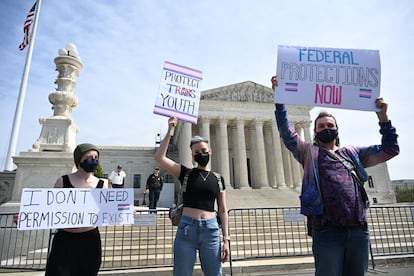Gender treatment of trans minors lands in the US Supreme Court
The justices are considering the case of the parents of a teenager who sued the State of Tennessee for prohibiting her access to hormone therapies until she is 18 years old


Treatments for transgender minors, one of the most controversial issues in American society today, will reach the U.S. Supreme Court Wednesday in the most important case to date on the rights of trans people in the country. The nine justices will study a lawsuit filed by the outgoing Joe Biden administration against Tennessee, a state that, along with 25 others governed by the Republican Party, since 2021 has prohibited the administration of such care until the age of 18.
It is one of the most relevant cases in a judicial year in which Donald Trump will be sworn in as president, having appointed three of the nine Supreme Court judges during his previous stay in the White House. That inflation of appointments unbalanced its composition for a considerable length of time, given that the positions are for life, leading to a Supreme Court conservative supermajority (6-3), that is unprecedented since the 1930s.
Trump has launched attacks on “gender ideology” and trans people, with a special focus on minors, their parents, and the doctors who treat these families, one of the pillars of his successful electoral campaign. His administration is expected to take the path of cutting rights. In a video released a few days after his victory, the president-elect promised to end “gender insanity” and defined the treatment of minors as “an act of child abuse.” “It’s very simple, my plan is to stop the chemical, physical, and emotional mutilation of our youth,” he added.
The plan also includes banning trans women from using women’s bathrooms, as House Speaker Mike Johnson intends with a decision he made two weeks ago to prevent the first transgender congresswoman in history, Sarah McBride, who will take office in January, from doing so on Capitol Hill. Republicans have also put the “protection” of women’s sports and the prohibition of trans athletes from competing in certain disciplines on their agenda.

United States v. Skrmetti pits the federal government against Tennessee Attorney General Jonathan Skrmetti. The issue is whether a law in the southern state violates the 14th Amendment, which guarantees the equality of all citizens. The Tennessee law prohibits all medical treatments designed to enable, as the text says, “a minor to identify with, or live as, a purported identity inconsistent with the minor’s sex,” or to treat “purported discomfort or distress from a discordance between the minor’s sex and asserted identity.” The judges are therefore not faced with the dilemma of whether it is the parents or the government who should decide about the health of their children, but rather whether the law in question discriminates against those minors.
The origin of the case is in the lawsuit filed against Tennessee by three families, including that of Brian Williams, the father of a trans minor who was receiving “gender-affirming care” at the time of the law’s enactment, an umbrella that includes everything from psychological therapy to so-called social transition (changing name, use of pronouns, clothing, etc.), and from puberty blockers to the administration of estrogen or testosterone and sex-change surgery. “After nine months of discussions and consultations with experts, taking into consideration the risks and long-term consequences, L. W. began taking puberty-suppressing drugs at age 13 and, almost a year later, began hormone therapy,” Williams explained Monday in a virtual meeting with journalists. “Today she is a happy 16-year-old girl who thinks about her future, a future that my daughter deserves and that Tennessee’s ban seriously threatens,” he reasoned. The law prohibits such treatments.
In a brief filed with the Supreme Court, Skrmetti argues that the challenged law “does not include any classification by sex” and therefore cannot be discriminatory. The line drawn by the legal text, according to the Attorney General of Tennessee, distinguishes between minors “seeking drugs for gender transition and minors seeking drugs for other medical purposes [...] boys and girls fall on both sides of that line.” Those who defend the prohibition of such treatments before the age of 18 recall the cases of those who have received them and regretted it some time later, raise doubts about the side effects of the drugs, and argue that there is not enough scientific evidence to justify these treatments.
The country’s leading medical organizations, including the American Medical Association and the American Academy of Pediatrics, oppose banning gender-based care for minors — as long as it is provided appropriately and with psychological supervision — and warn of the risk of depression or even suicide if they do not receive it. In countries such as the United Kingdom, Sweden, and Finland, public health systems have stopped prescribing puberty blockers because of concerns about their suitability for treating gender dysphoria.
The argument of discrimination
The Williams’ arguments — which they lost in the lower courts before the Biden administration (which for now, until Trump’s arrival, remains the “United States” in the case) — will be defended by Chase Strangio, the first trans lawyer to do so before the highest U.S. judicial body. In the aforementioned call with the press, Strangio trusted that the high court will respect the precedents in which its justices have maintained over the years that sexual discrimination violates the Constitution, such as when they studied a case in 2020 on the treatment of LGBTQI+ people in the workplace, or when they considered that “all distinctions based on gender” are unconstitutional (as concluded in the 1996 case United States v. Virginia).
Wednesday’s session will serve to give an idea of where the ruling will go and whether the current majority considers that “all classifications” includes trans people. The ruling will not be announced until the finalization of the judicial term, at the end of June.
According to the Williams Institute at the University of California, Los Angeles School of Law, there are about 300,000 people aged between 13 and 17, and 1.3 million adults, in the United States who identify as transgender. Although these are very small numbers compared to the country’s population (of about 330 million inhabitants), the discussion about their rights has occupied a much larger space during Biden’s presidency than it proportionally should in the public debate. It also helped Trump win, according to electoral analyses carried out after the election. One of the Republican slogans that was most popular with voters was: “Kamala is for they/them, President Trump is for you.” The Washington Post estimated that the Trump campaign spent more than $250 million on ads targeting this group.
Sign up for our weekly newsletter to get more English-language news coverage from EL PAÍS USA Edition
Tu suscripción se está usando en otro dispositivo
¿Quieres añadir otro usuario a tu suscripción?
Si continúas leyendo en este dispositivo, no se podrá leer en el otro.
FlechaTu suscripción se está usando en otro dispositivo y solo puedes acceder a EL PAÍS desde un dispositivo a la vez.
Si quieres compartir tu cuenta, cambia tu suscripción a la modalidad Premium, así podrás añadir otro usuario. Cada uno accederá con su propia cuenta de email, lo que os permitirá personalizar vuestra experiencia en EL PAÍS.
¿Tienes una suscripción de empresa? Accede aquí para contratar más cuentas.
En el caso de no saber quién está usando tu cuenta, te recomendamos cambiar tu contraseña aquí.
Si decides continuar compartiendo tu cuenta, este mensaje se mostrará en tu dispositivo y en el de la otra persona que está usando tu cuenta de forma indefinida, afectando a tu experiencia de lectura. Puedes consultar aquí los términos y condiciones de la suscripción digital.








































